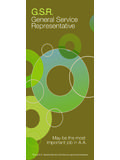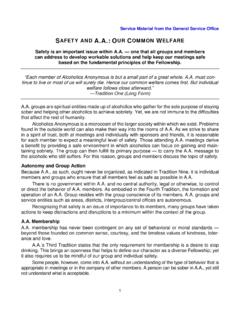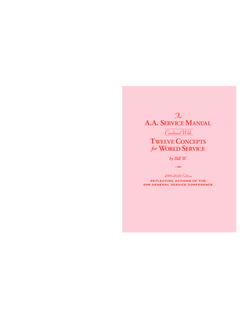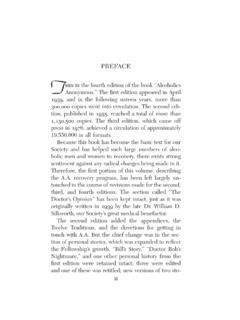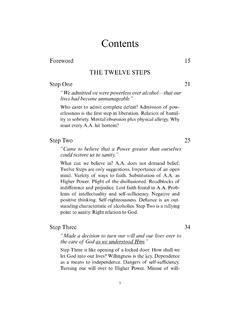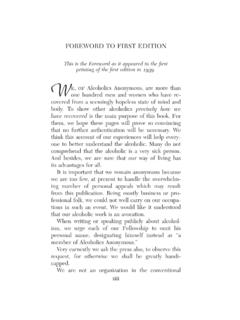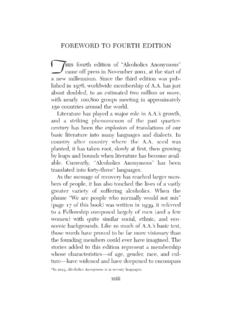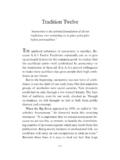Transcription of Twelve Steps - Step Five - (pp. 55-62)
1 55 Step Five Admitted to God, to ourselves, and to another human being the exact nature of our wrongs. ALL of s Twelve Steps ask us to go contrary to our natural desires .. they all defl ate our egos. When it comes to ego defl ation, few Steps are harder to take than Five. But scarcely any Step is more necessary to longtime sobri-ety and peace of mind than this experience has taught us we cannot live alone with our pressing problems and the character defects which cause or aggravate them. If we have swept the searchlight of Step Four back and forth over our careers, and it has revealed in stark relief those experiences we d rather not remember, if we have come to know how wrong thinking and action have hurt us and others, then the need to quit living by ourselves with those tormenting ghosts of yester-day gets more urgent than ever.
2 We have to talk to some-body about intense, though, is our fear and reluctance to do this, that many s at fi rst try to bypass Step Five. We search for an easier way which usually consists of the general and fairly painless admission that when drinking we were sometimes bad actors. Then, for good measure, we add dramatic descriptions of that part of our drinking behav-ior which our friends probably know about of the things which really bother and burn us, we STEP FIVE56say nothing. Certain distressing or humiliating memories, we tell ourselves, ought not be shared with anyone. These will remain our secret. Not a soul must ever know. We hope they ll go to the grave with if s experience means anything at all, this is not only unwise, but is actually a perilous resolve. Few muddled attitudes have caused us more trouble than holding back on Step Five.
3 Some people are unable to stay sober at all; oth-ers will relapse periodically until they really clean house. Even oldtimers, sober for years, often pay dearly for skimping this Step. They will tell how they tried to car-ry the load alone; how much they suffered of irritability, anxiety, remorse, and depression; and how, unconsciously seeking relief, they would sometimes accuse even their best friends of the very character defects they themselves were trying to conceal. They always discovered that relief never came by confessing the sins of other people. Everybody had to confess his practice of admitting one s defects to another per-son is, of course, very ancient. It has been validated in every century, and it characterizes the lives of all spiritu-ally centered and truly religious people.
4 But today religion is by no means the sole advocate of this saving principle. Psychiatrists and psychologists point out the deep need ev-ery human being has for practical insight and knowledge of his own personality fl aws and for a discussion of them with an understanding and trustworthy person. So far as alcoholics are concerned, would go even further. Most of us would declare that without a fearless admis-sion of our defects to another human being we could not STEP FIVE57stay sober. It seems plain that the grace of God will not enter to expel our destructive obsessions until we are will-ing to try are we likely to receive from Step Five? For one thing, we shall get rid of that terrible sense of isolation we ve always had. Almost without exception, alcoholics are tortured by loneliness.
5 Even before our drinking got bad and people began to cut us off, nearly all of us suf-fered the feeling that we didn t quite belong. Either we were shy, and dared not draw near others, or we were apt to be noisy good fellows craving attention and companion-ship, but never getting it at least to our way of thinking. There was always that mysterious barrier we could neither surmount nor understand. It was as if we were actors on a stage, suddenly realizing that we did not know a single line of our parts. That s one reason we loved alcohol too well. It did let us act extemporaneously. But even Bacchus boomeranged on us; we were fi nally struck down and left in terrifi ed we reached , and for the fi rst time in our lives stood among people who seemed to understand, the sense of belonging was tremendously exciting.
6 We thought the isolation problem had been solved. But we soon discovered that while we weren t alone any more in a social sense, we still suffered many of the old pangs of anxious apartness. Until we had talked with complete candor of our confl icts, and had listened to someone else do the same thing, we still didn t belong. Step Five was the answer. It was the begin-ning of true kinship with man and vital Step was also the means by which we began to STEP FIVE58get the feeling that we could be forgiven, no matter what we had thought or done. Often it was while working on this Step with our sponsors or spiritual advisers that we fi rst felt truly able to forgive others, no matter how deep-ly we felt they had wronged us. Our moral inventory had persuaded us that all-round forgiveness was desirable, but it was only when we resolutely tackled Step Five that we inwardly knew we d be able to receive forgiveness and give it, great dividend we may expect from confi ding our defects to another human being is humility a word often misunderstood.
7 To those who have made progress in , it amounts to a clear recognition of what and who we really are, followed by a sincere attempt to become what we could be. Therefore, our fi rst practical move toward humil-ity must consist of recognizing our defi ciencies. No defect can be corrected unless we clearly see what it is. But we shall have to do more than see. The objective look at ourselves we achieved in Step Four was, after all, only a look. All of us saw, for example, that we lacked honesty and tolerance, that we were beset at times by attacks of self-pity or delusions of personal grandeur. But while this was a humiliating experi-ence, it didn t necessarily mean that we had yet acquired much actual humility. Though now recognized, our defects were still there. Something had to be done about them. And we soon found that we could not wish or will them away by realism and therefore more honesty about our-selves are the great gains we make under the infl uence of Step Five.
8 As we took inventory, we began to suspect how STEP FIVE59much trouble self-delusion had been causing us. This had brought a disturbing refl ection. If all our lives we had more or less fooled ourselves, how could we now be so sure that we weren t still self-deceived? How could we be certain that we had made a true catalog of our defects and had really admitted them, even to ourselves? Because we were still bothered by fear, self-pity, and hurt feelings, it was prob-able we couldn t appraise ourselves fairly at all. Too much guilt and remorse might cause us to dramatize and exag-gerate our shortcomings. Or anger and hurt pride might be the smoke screen under which we were hiding some of our defects while we blamed others for them. Possibly, too, we were still handicapped by many liabilities, great and small, we never knew we it was most evident that a solitary self-appraisal, and the admission of our defects based upon that alone, wouldn t be nearly enough.
9 We d have to have outside help if we were sure-ly to know and admit the truth about ourselves the help of God and another human being. Only by discussing ourselves, holding back nothing, only by being willing to take advice and accept direction could we set foot on the road to straight think-ing, solid honesty, and genuine many of us still hung back. We said, Why can t God as we understand Him tell us where we are astray? If the Creator gave us our lives in the fi rst place, then He must know in every detail where we have since gone wrong. Why don t we make our admissions to Him directly? Why do we need to bring anyone else into this? At this stage, the diffi culties of trying to deal rightly with God by ourselves are twofold. Though we may at fi rst STEP FIVE60be startled to realize that God knows all about us, we are apt to get used to that quite quickly.
10 Somehow, being alone with God doesn t seem as embarrassing as facing up to an-other person. Until we actually sit down and talk aloud about what we have so long hidden, our willingness to clean house is still largely theoretical. When we are honest with another person, it confi rms that we have been honest with ourselves and with second diffi culty is this: what comes to us alone may be garbled by our own rationalization and wishful thinking. The benefi t of talking to another person is that we can get his direct comment and counsel on our situation, and there can be no doubt in our minds what that advice is. Going it alone in spiritual matters is dangerous. How many times have we heard well-intentioned people claim the guidance of God when it was all too plain that they were sorely mis-taken.
